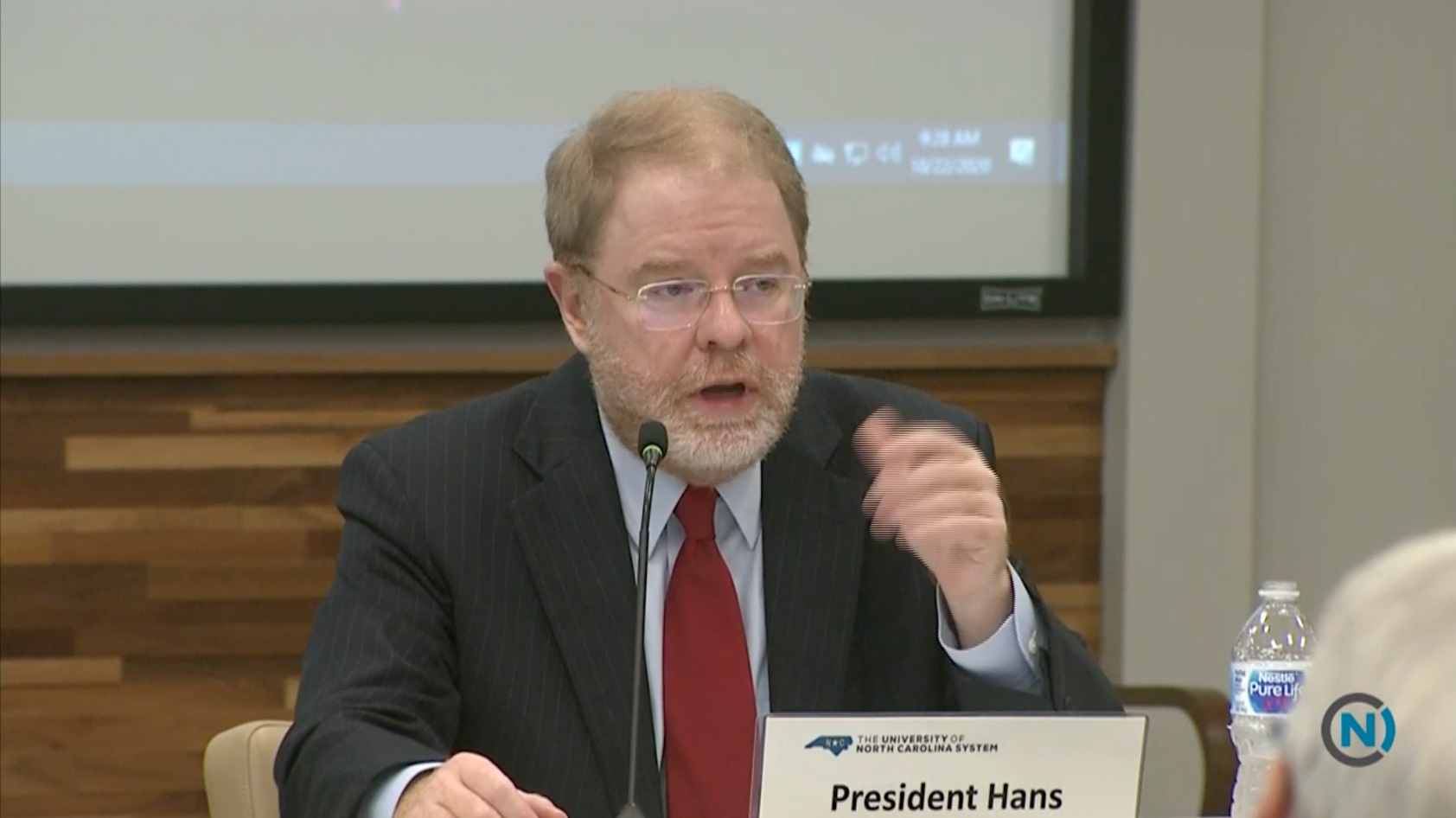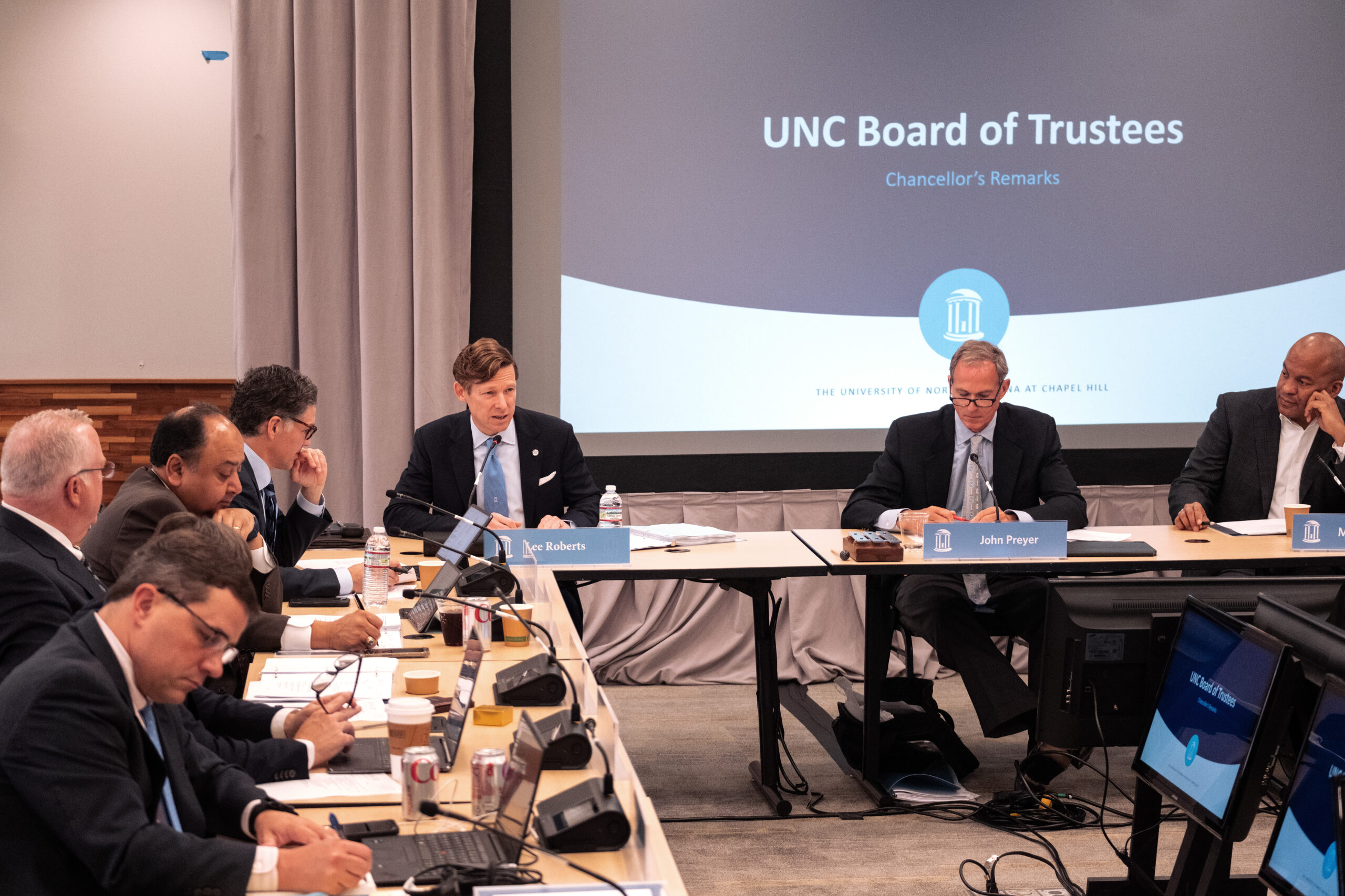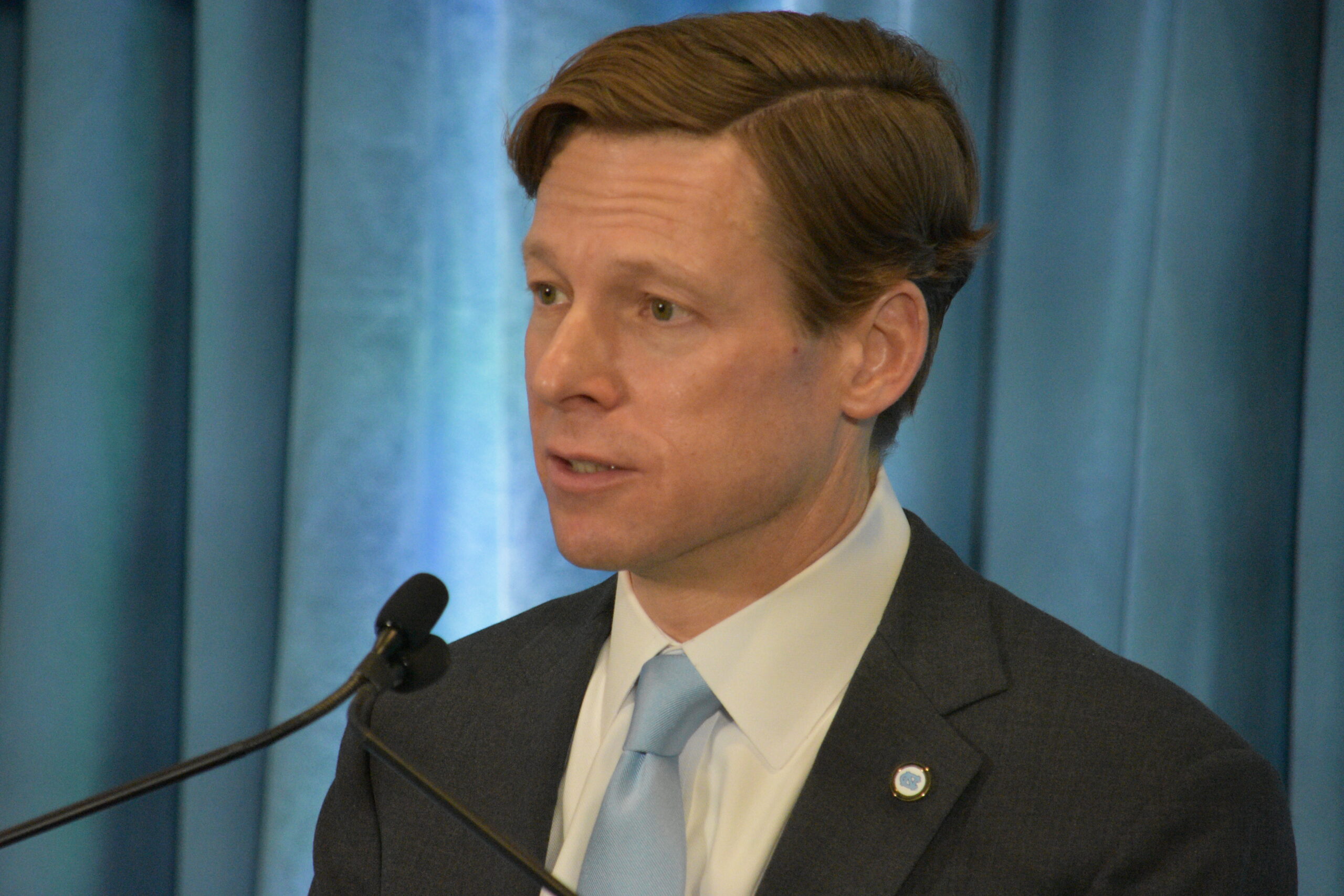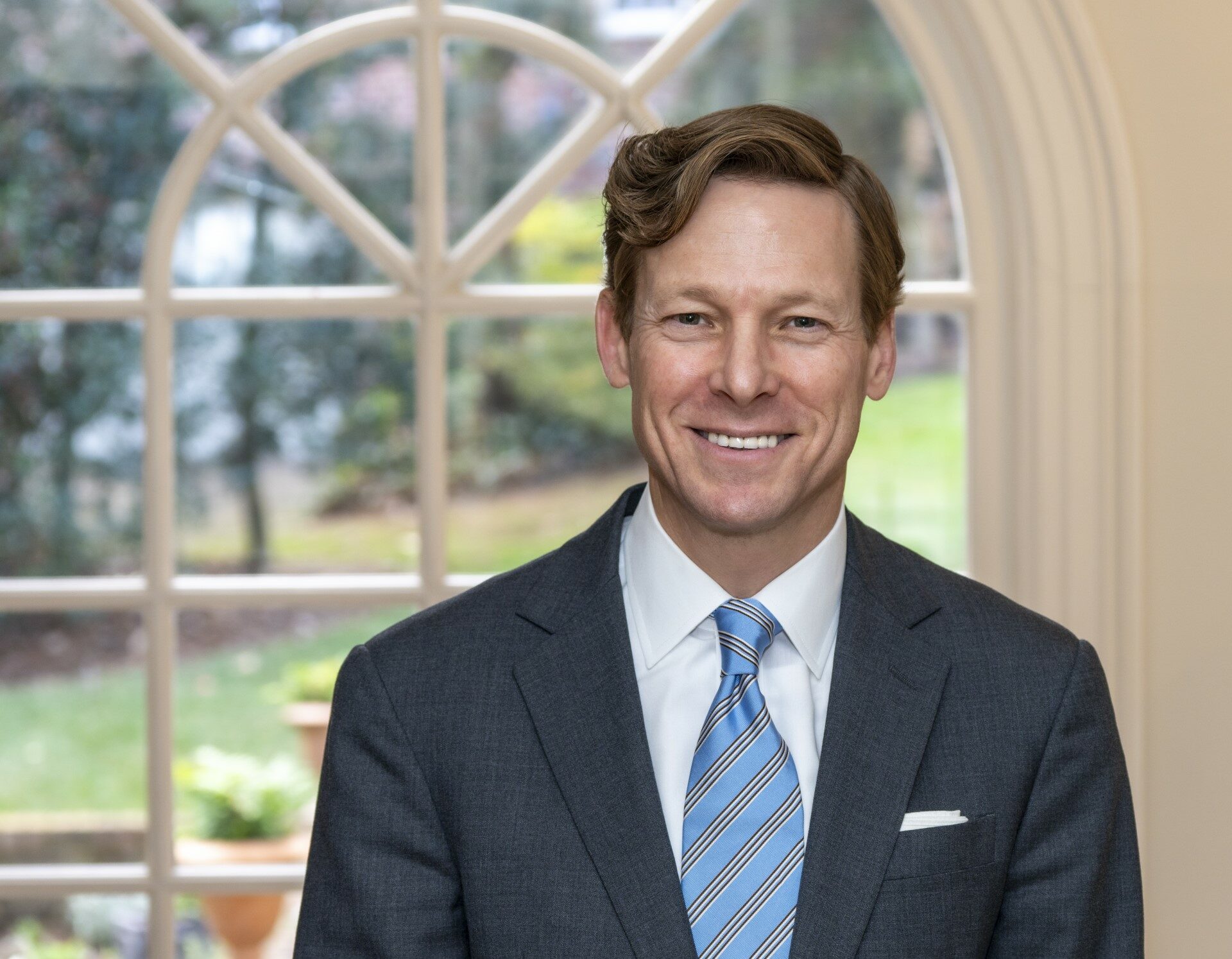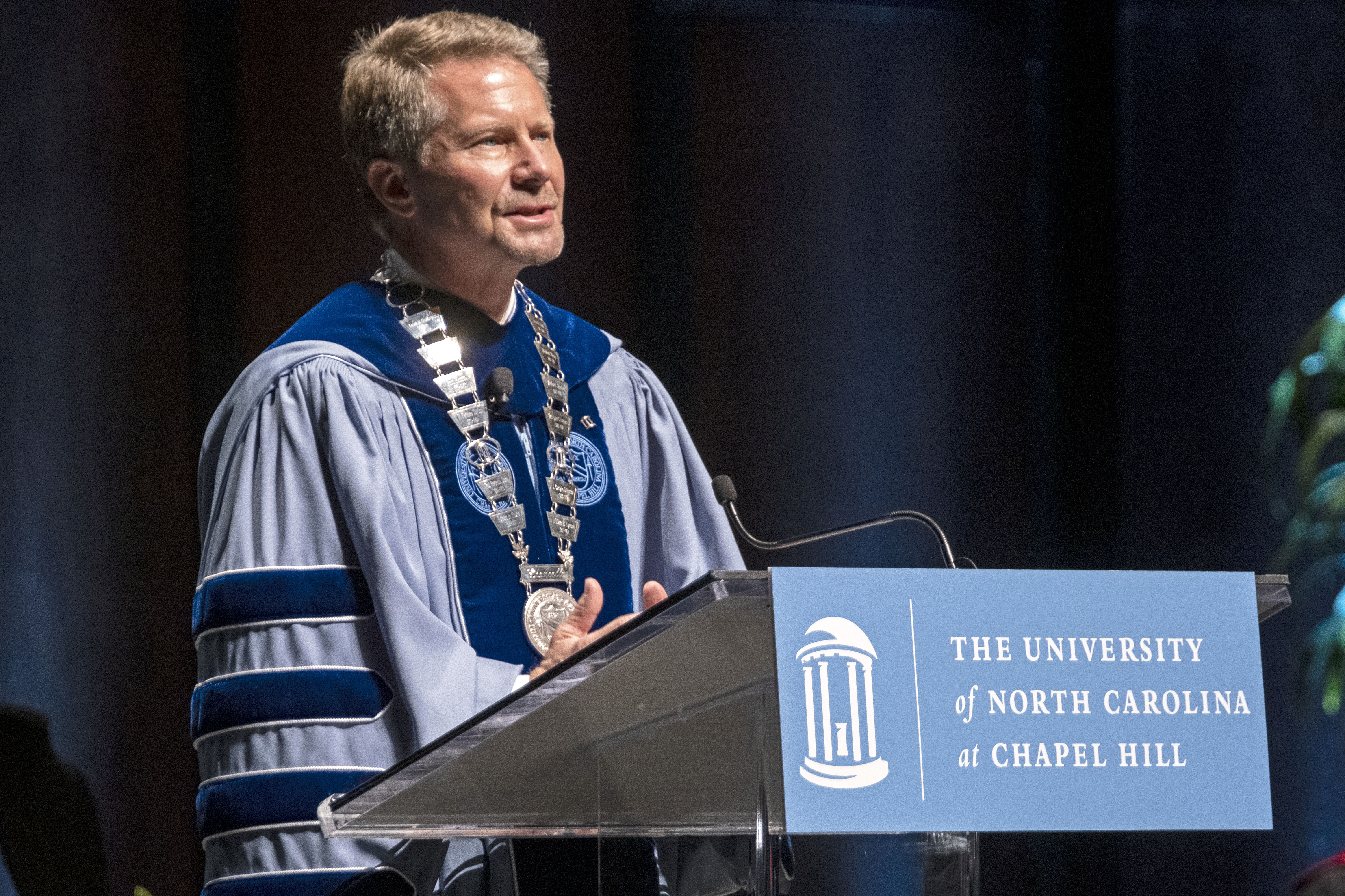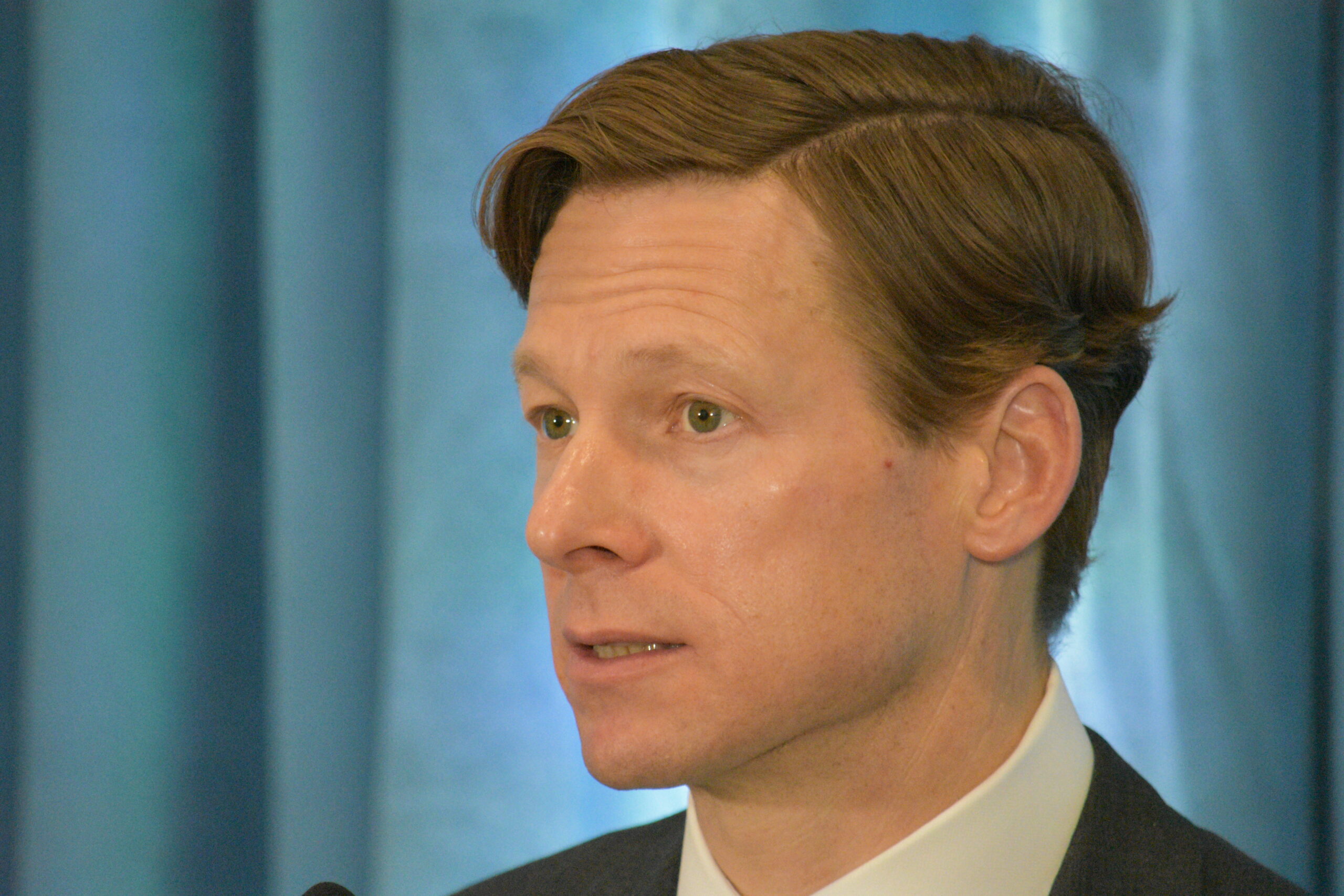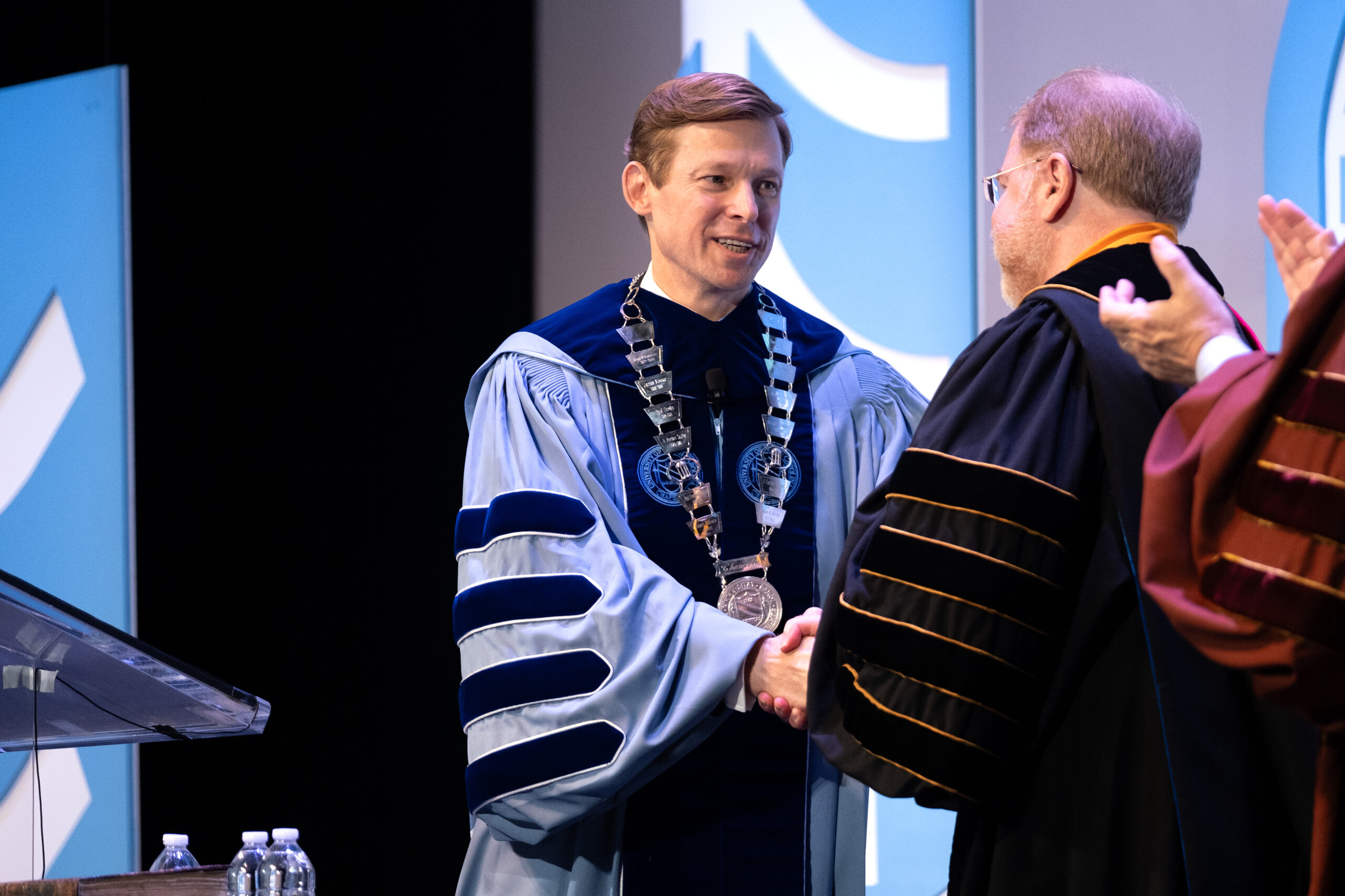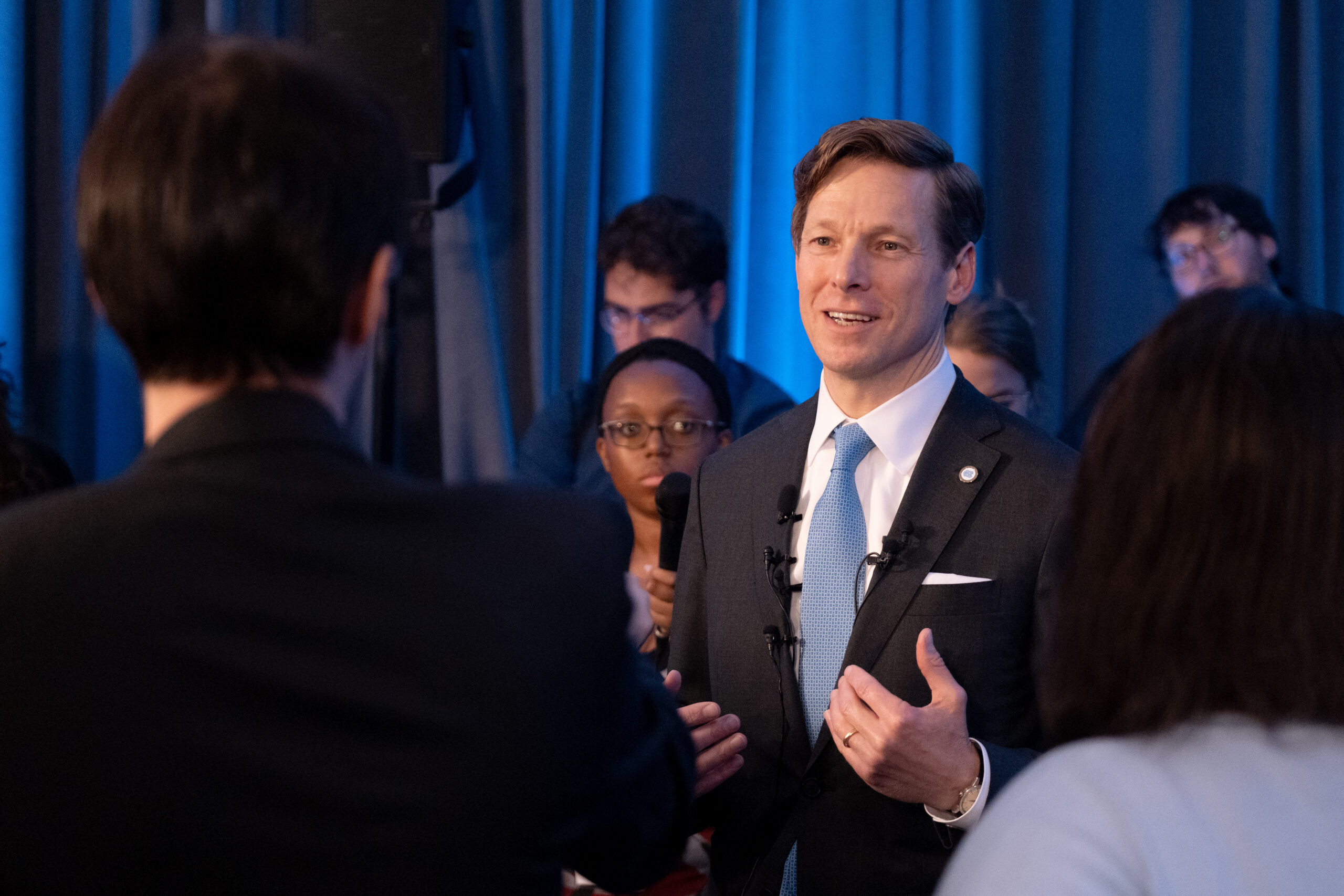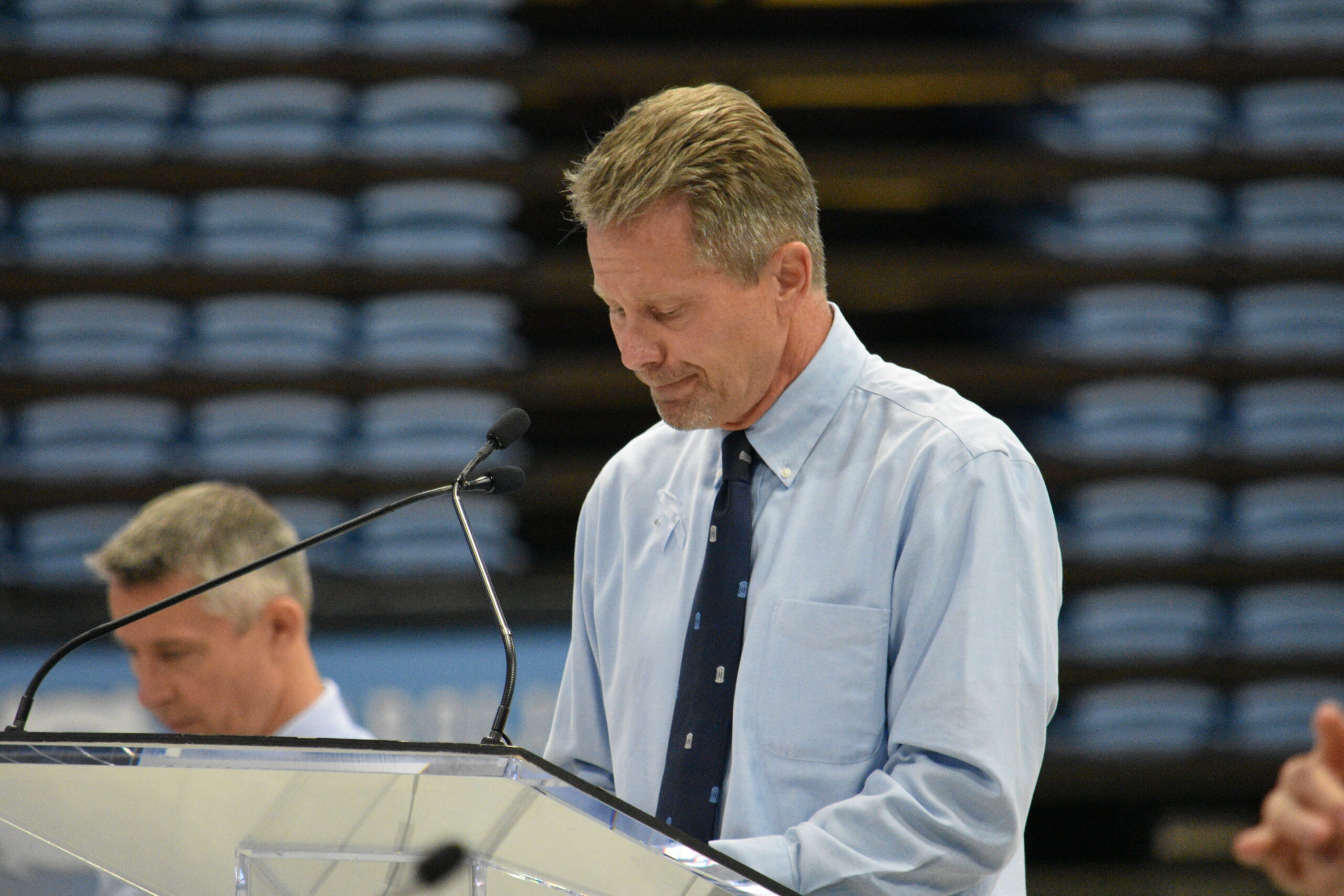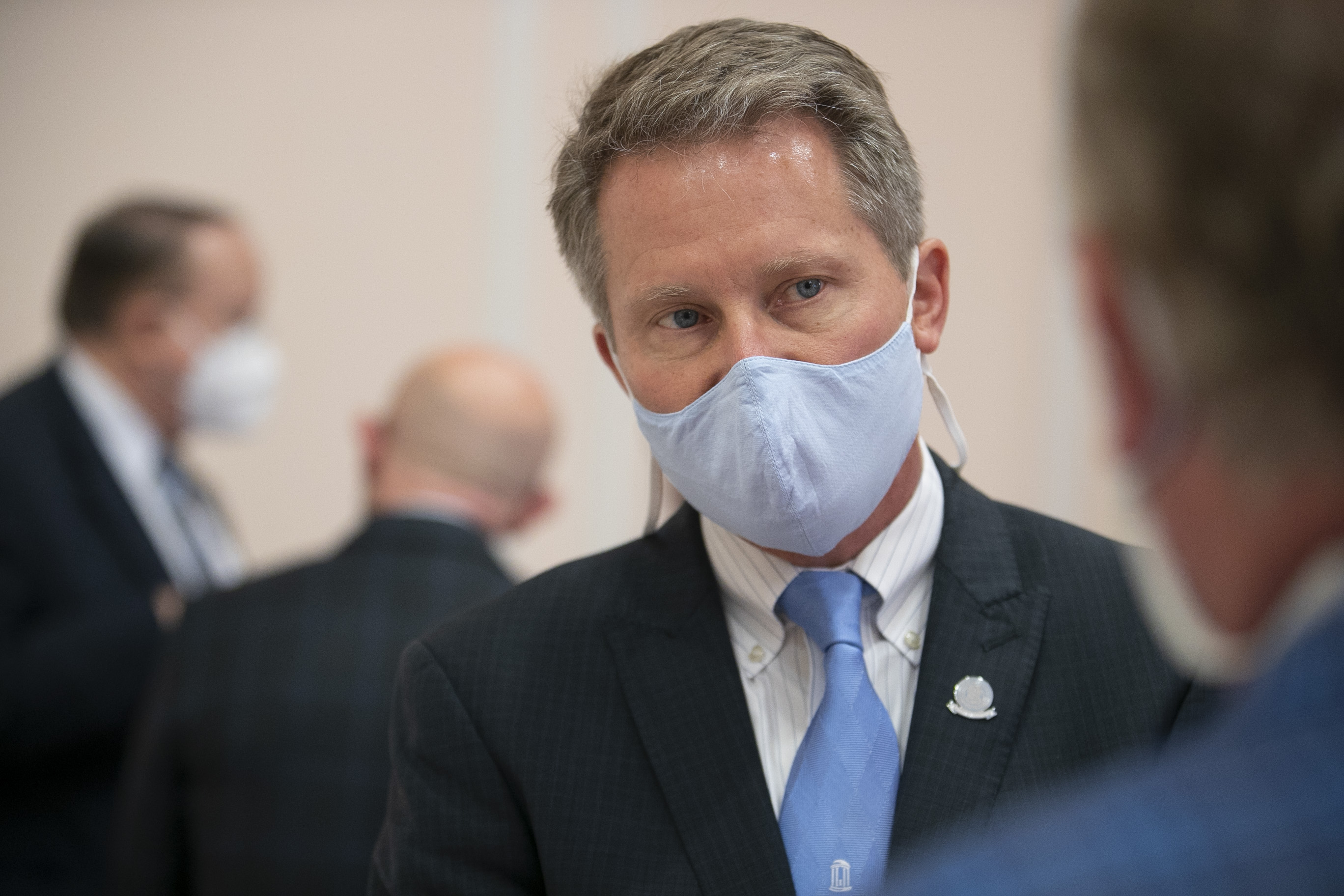
UNC Interim Chancellor Lee Roberts speaks with the media following a Board of Trustees meeting on January 18, 2024.
The flagship university of North Carolina has its new chancellor, with UNC once again turning to its interim option to assume the permanent mantle.
The UNC System Board of Governors approved the selection of Lee Roberts as the 13th chancellor in the Chapel Hill university’s history on Friday morning during a specially called session. The pick further elevates Roberts’ status after he was chosen to serve as interim chancellor by UNC System President Peter Hans last December following Kevin Guskiewicz’s departure for Michigan State.
“For 230 years, UNC-Chapel Hill has been the most important pillar on which we build a better future for North Carolina and its people,” Roberts said in a release by the UNC System. “I’m deeply honored to be asked to play a role in serving this great university. There’s a lot of exciting work ahead.”
Hans, who spoke at length about the selection process and Roberts’ vision for the university ahead of Friday’s vote, said he believes the financier will help UNC grow and step into its next phase of leadership in higher education with “a set of fresh eyes.”
“It’s next leader will need to deliver on the promise on operational excellence that matches Carolina’s academic prowess,” Hans said of UNC-Chapel Hill. “During a period of rapid growth of North Carolina, Carolina has moved at a slower pace. I believe it is time for Carolina to welcome more talent from across the state and across the country, and Roberts brings a pragmatic understanding of what it will take to expand this university’s service to a vibrant state.”
The selection process — which lasted several months and included an advisory search committee — finding its interim leader is not new to the campus community, with Guskiewicz having served as the interim chancellor for 10 months before his elevation to the permanent job in 2019.
Roberts’ professional path to chancellor is different than Carolina’s past leaders. With a background in finance, he began his career at Morgan Stanley doing real estate investment banking before becoming the managing director of Piedmont Community Bank Holdings. He served on North Carolina’s Banking Commission from 2012 to 2014 before joining Gov. Pat McCrory’s administration as the state budget director for two years. While his personal higher education experience saw him earn degrees at private schools, Roberts became more involved with the UNC System after joining a task force to review its funding before eventually joining the university system’s Board of Governors in 2021, where he served until abdicating the position to accept the interim chancellorship.
Since assuming the position, Roberts has consistently voiced his belief in public education being critical to North Carolina’s future and wellbeing of its residents. During his introductory press conference, he cited the Hippocratic Oath of “do no harm” as a core mantra he would follow during his interim leadership and prioritized listening to student and faculty’s needs. But he also indicated his belief that a new strategic plan for the university would be needed before long and emphasized his hope UNC can be a leader in developing technologies like artificial intelligence. When asked about concerns or approaches to avoiding political interference — whether from the state government, donors, trustees or other influences — Roberts also stressed his belief of reporting solely to the system president.
In the following months, Roberts’ most high-profile moment came in April as the campus community saw pro-Palestine demonstrations on Polk Place. Student activists and protestors started an encampment on the central quad, calling for an end to Israel’s military attacks on Gaza and for UNC to divulge its financial ties to Israel. Roberts’ administration cleared the encampment and arrested some demonstrators in the early morning hours of April 30, citing the university’s policies against temporary structures on the public grounds and use of academic buildings overnight. The scenes grew even more dramatic as demonstrators later took down the U.S. flag flying at the center of the quad in place of a Palestinian flag, and Roberts led a contingent of university and outside police officers to replace the flag. The clash led to some officers forcibly removing protestors from around the flagpole and others using items like pepper spray to move aside the gathered crowd.
In May, during an interview with 97.9 The Hill, Robert said the early morning arrests around the pro-Palestine encampment happened because the group deliberately violated policies the university had made clear to them about protesting on campus. He added that while nobody “wants to see college students get arrested,” UNC was going to enforce and uphold its “very simple, not particularly stringent rules.”
“If the protestors had continued following the rules,” said Roberts, “there wouldn’t have been any escalation at all. I think it was pretty clear to everyone that they were the ones who had decided to force a confrontation.
“I obviously wish that hadn’t happened,” he later said about the police’s clash with demonstrators at the flagpole. “I had hoped that the protestors would disperse. I think we all did. That’s what we had asked them to do. They decided to go the other way.”
That response, and how the aftermath was handled, was highlighted by Hans during his comments about choosing Roberts. The UNC System President said he believes it to be an example of Roberts keeping his focus “where it needed to be — not on himself, but on the university and its mission.”
“When I appointed Roberts as interim chancellor, I said that Carolina would benefit from calm, steady, focused leadership,” Hans added. “And through this period of turmoil for higher education, it has. He has been willing to make tough decisions under immense pressure and to stand behind the core principles of this place. Even when it’s difficult, he has consistently defended the academic freedom of faculty, the rights of students, and the interest of the institution in meeting its educational mission.”
The UNC System established a search committee for the permanent chancellor selection in February, as is required by the public university system. But the process came under fire by student leaders for its lack of representation of the undergraduate and graduate student population, with only the former undergraduate student body president Christopher Everett among the members. It was also scrutinized for not scheduling more listening sessions with campus community during the fall after Hans’ administration expressed plans to do hold more when the committee first met. The UNC System said based on the depth of information from a community-wide survey asking for leadership qualities and experience sought in a permanent chancellor — which saw more than 2,500 responses — and input gathered from five listening sessions in the spring, the committee had enough feedback to create candidate profiles.
The 13-person board — smaller than the 20-member board during the previous committee in 2019 — also included two faculty leaders, three university trustees, two UNC System governors, one former UNC System governor, the president of UNC’s general alumni association, the chancellor of UNC Greensboro, and the system president Hans.
In the university’s release about Roberts’ selection, Chair of the Board of Trustees John Preyer and Chair of the Chancellor Search Advisory Committee Dr. Cristy Page wrote the committee appreciated the “valuable input” provided by the campus community to form its search process.
“What stood out to us about Chancellor Roberts,” they said, “was the fact that during his time as the interim chancellor he set a vision for the University rooted in its core mission to serve the state of North Carolina, educate the next generation of leaders and conduct life-changing research. Now that he has been elected, we look forward to working with him as he continues to guide our University with humility, empathy and determination.”
UNC called a press conference for Roberts’ first public introduction as permanent chancellor for 2 p.m. on Friday. The livestream of the press conference can be watched on the university’s YouTube channel.
Chapelboro.com does not charge subscription fees, and you can directly support our efforts in local journalism here. Want more of what you see on Chapelboro? Let us bring free local news and community information to you by signing up for our newsletter.

